Abortion protests planned
By Belinda Robinson in New York | China Daily Global | Updated: 2019-05-21 23:23

Tens of thousands of women and men will take to the streets nationwide on Tuesday to protest stringent new abortion bans in several states, as well as Alabama's all-out ban on abortion.
More than 350 demonstrations are planned at statehouses, town squares and court houses across America. A central rally will be held in Washington DC in front of the Supreme Court building.
The protests have been organized by a coalition of groups including Planned Parenthood, the American Civil Liberties Union, NARAL Pro-Choice America and other groups.
A spokeswoman for #Stopthebans, the group behind the protests, said in a statement: "Across the country, we are seeing a new wave of extreme bans on abortion, stripping away reproductive freedom and representing an all-out assault on abortion access."
The marches come just days after Alabama's Governor Kay Ivey signed the strictest abortion law in the nation — which makes performing an abortion a felony, punishable by up to 99 years in prison — even in cases of rape or incest. There is no punishment for the mother only the doctor, but an abortion is only legal in the state if the mother's health is at risk.
On Sunday, a series of pro-choice protests took place against the bans in Birmingham and Huntsville, Alabama.
Hundreds of demonstrators, mainly women, held placards as they marched to Alabama's capital in Montgomery, chanting "my body, my choice," and "vote them out."
Dr. Leana Wen, president of the Planned Parenthood Action Fund, said in a statement: "Women are outraged... Now more than ever, we must unite against this unprecedented attack on our fundamental rights and freedoms…We will stand together to defend our right to safe, legal abortion. Because we are in the fight of our lives."
The debate around abortion has come to the fore after several conservative-run states began ramping up challenges to Roe v. Wade, the Supreme Court's 1973 decision that legalized abortion.
Some factions want to deny a woman's right to have an abortion once a fetal heartbeat can be detected.
Georgia, Kentucky, Mississippi and Ohio are among the states that have adopted statutes banning abortions once a fetal heartbeat is detected.
On Friday, Missouri approved legislation banning abortions after eight weeks — often before a woman knows she is pregnant. Like Alabama, it does not allow exceptions for cases of rape or incest.
Altogether, 16 states, mainly in the South, have passed or are debating heartbeat laws.
A spokeswoman for #Stopthebans said: "We will show up to speak out and fight back against this unconstitutional attempt to gut Roe and punish women. Politicians shouldn't be making decisions best left to women, their families, and their doctors."
The bans, many of which are not yet laws, will face immediate and lengthy legal challenges in the courts and may even go to The Supreme Court, but pro-life campaigners say, despite the opposition, an important message is being heard.
"We are trying to engage the culture in the value of life from the womb and that's what some of these bills are designed to do," Eric Scheidler, executive director of the Pro-Life Action League, told China Daily. "The heartbeat bills, in particular, are a teaching tool, explaining to people who don't really think about it, that every one of our hearts is beating right now, and they began to beat within a few weeks after conception."
The number of registered voters who support preserving abortion rights grew to a high of 71 percent in July 2018, according to a Wall Street Journal-NBC News poll.
Conservatives are split over their support for the 1973 Roe v. Wade decision, with 44 percent in favor of overturning it and 46 percent in favor of keeping it.
"It really shows a great deal of enthusiasm and momentum seeing these various bills, from 20-week bans to the more notable bills like the Ohio and Georgia heartbeat bans, and the Alabama total ban," Scheidler said. "Just because a child's father was a rapist, does not mean that child deserves the death penalty."
But he acknowledged there was "a mutual backlash going on".
"The blue states are surging towards more expansive abortion and the red states are trying to find a way to restrict abortions. You're seeing a split that is tearing the country apart on this issue."
On Saturday, US President Donald Trump joined other prominent Republicans — including Senator Mitt Romney, Senate Majority Leader Mitch McConnell and televangelist Pat Robertson — in distancing himself from Alabama's law.
Trump tweeted: "As most people know, and for those who would like to know, I am strongly Pro-Life, with the three exceptions — Rape, Incest and protecting the Life of the mother — the same position taken by Ronald Reagan".
Trump encouraged conservatives to have a unified voice on the issue.
Several Democrats, including US senators and Democratic presidential candidates Amy Klobuchar and Bernie Sanders, weighed in on the issue over the weekend.
A 2018 poll by The Wall Street Journal found that 84 percent of college-educated women are against overturning the Roe v. Wade decision.
























